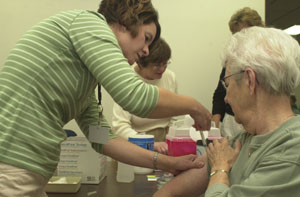By Lance Mihm
lmihm@dailystandard.com

WAPAKONETA -- Flu vaccine shortages will have an impact in both Auglaize and Mercer counties and local health departments are preparing for the worst.
Mercer County-Celina City Health Department has already exhausted its total of a little over 800 vaccinations in three clinics, the last of which was Tuesday. Auglaize County has 1,760 vaccinations to disperse in its clinics beginning Monday of next week.
Nationwide, health departments, pediatricians and family doctors expected to receive about 100 million vaccinations in the United States. However, British regulators unexpectedly shut down a major U.S. vaccine supplier, Chiron Corp., recently freezing shipment of up to 48 million expected flu shots.
That shutdown left Aventis as this year's sole supplier of injectable flu vaccine, a total of 55.4 million doses. That number leaves the nation with about half its intended flu vaccine supply, despite an expected heavier flu season this year. Dr. David Nelson of the Auglaize County Health Board said experts are predicting 207,000 deaths in 2005 due to the flu outbreak, well over last year's total of 36,000, which was considered a large outbreak.
"The vaccinations we have right now will be given on a first come, first serve basis, and only high risk people will get the vaccination," said Auglaize County health commissioner Charlotte Parsons.
Parsons said the department is receiving its normal shipment but it would not be near enough this year because private practices are not receiving any vaccine. That leads to an increased demand on the health department. Auglaize County will conduct vaccination clinics next week in Wapakoneta, New Bremen, St. Marys, Waynesfield and Minster.
People will be screened for high risk. Parsons defined the high risk groups as senior citizens 65 and older, children 6-23 months, and people with chronic health problems such as asthma, diabetes, heart problems or compromised immune systems. The shots will also be designated for pregnant women, residents in nursing homes, health care workers with direct patient contact and out of home caregivers such as babysitters.
"These people are the most vulnerable and they are the ones who have the hardest problem recovering from the flu," Parsons said.
Experts have predicted the strain of flu this year will be the same Fujian strain that surprised doctors last season. Flu vaccines are generally prepared according to the strain that is expected to be the most prevalent during the flu season.
There have been scattered reports of price gouging since the shortage was announced, and Kansas filed a lawsuit Tuesday against Meds-Stat, a pharmaceutical distributor. Attorney General Phill Kline said Meds-Stat proposed selling the vaccine to a pharmacy in Kansas City, Kan., last Friday for $900 per vial; a week earlier, the company was selling the vaccine for $85 per vial. Each vial contains about 10 doses.
Tuesday, two companies revealed they had offered the government flu vaccine originally intended for sale abroad. GlaxoSmithKline has 500,000 doses manufactured in Germany; ID Biomedical is offering 1 million to 1.5 million doses made in Canada. However, the Food and Drug Administration hasn't approved either vaccine brand for sale in this country. U.S. officials are still negotiating with the Canadian company.
"We don't know what kind of a flu season we are going to have, but there will be a lot of high risk people not vaccinated," said Mercer County Health Department nursing director Sally Bowman. "We are hoping we can still get more for the pediatric age group.
Parsons said that education from further transmission will be a major weapon if there is a large outbreak coupled with the shortage. She said people suspecting they have the flu should see doctors, particularly those in the designated high risk groups. Preventive measures such as drinking liquids, resting, staying at home, and frequent hand washing should also be done.
-- The Associated Press contributed to this story.
|

